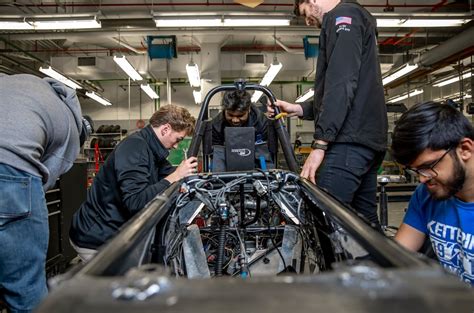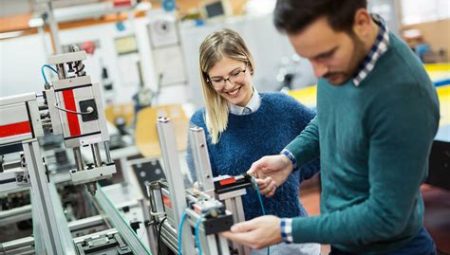Are you interested in becoming a part of the technological revolution in transportation? Look no further than the automotive engineering programs at universities in the United States. With a growing demand for automotive engineers, specialized degree programs, cutting-edge research opportunities, and collaboration with industry leaders, these programs are at the forefront of innovation in the field. Students have the opportunity to gain hands-on experience through internships, access state-of-the-art facilities and laboratories, and learn about sustainable transportation solutions and emerging technologies. Additionally, students have access to a diverse network of professionals in the industry, which can lead to promising career prospects and high job placement rates upon graduation. In this blog post, we will explore how automotive engineering programs at US universities are revolutionizing transportation and providing students with the skills and knowledge needed to thrive in this dynamic field.
Table of Contents
1. Growing demand for automotive engineers
In today’s rapidly evolving automotive industry, there is a growing demand for skilled automotive engineers who can drive innovation and develop cutting-edge solutions. With the emergence of electric and self-driving vehicles, the need for engineers with specialized knowledge in these areas has never been higher.
As the automotive landscape continues to shift towards sustainable and eco-friendly solutions, there is an increasing emphasis on developing alternative fuel systems and efficient powertrains. This has created exciting opportunities for engineers who are passionate about creating a cleaner and greener future for transportation.
Collaboration with industry leaders is essential for staying at the forefront of the automotive engineering field. Students who pursue specialized degrees in automotive engineering will have the chance to work on groundbreaking research projects and gain hands-on experience through internships with leading companies in the industry.
With access to state-of-the-art facilities and cutting-edge laboratories, aspiring automotive engineers will be well-equipped to tackle the challenges of tomorrow. The integration of emerging technologies and a focus on sustainable transportation solutions will prepare students to make a meaningful impact on the future of the automotive industry.
2. Specialized automotive engineering degrees
Specialized automotive engineering degrees are becoming increasingly popular as the automotive industry continues to evolve and expand. Students who are passionate about cars, technology, and innovation are gravitating towards these specialized programs in order to gain the skills and knowledge needed to succeed in this competitive field.
These programs offer a comprehensive curriculum that covers a wide range of topics, including vehicle design, manufacturing processes, advanced materials, and vehicle dynamics. Students also have the opportunity to specialize in areas such as electric vehicles, autonomous driving technology, and sustainable transportation solutions.
One of the key advantages of pursuing a specialized automotive engineering degree is the opportunity to work closely with industry experts and leaders. Many of these programs have established partnerships with leading automotive companies, providing students with valuable networking opportunities and real-world experience.
Upon completion of the program, graduates are well-prepared to enter the workforce and make significant contributions to the automotive industry. The demand for individuals with specialized automotive engineering degrees is on the rise, and the career prospects and job placement rates for these graduates are very promising.
3. Cutting-edge research opportunities
At our university, we offer cutting-edge research opportunities for students who are interested in pushing the boundaries of automotive engineering. We have state-of-the-art facilities and laboratories that provide the perfect environment for students to pursue their research interests. Whether it’s in alternative fuel sources, electric vehicles, or autonomous driving technology, our students have the chance to work on projects that are at the forefront of the industry.
Additionally, our faculty members are involved in groundbreaking research, giving students the chance to work alongside experts in the field. This hands-on experience not only allows students to contribute to important research initiatives, but also provides valuable networking opportunities that can benefit them in their future careers.
We also encourage collaboration between different departments and disciplines, allowing students to explore a wide range of research topics and approaches. This interdisciplinary approach fosters innovation and creativity, and gives students a broader understanding of the complex challenges facing the automotive industry today.
Furthermore, our university has strong partnerships with industry leaders, giving students access to real-world challenges and opportunities for applied research. This unique combination of industry collaboration, cutting-edge facilities, and expert faculty guidance makes our program a hub for cutting-edge research opportunities in automotive engineering.
4. Collaboration with industry leaders
Collaboration with industry leaders is an integral part of our automotive engineering program. We understand the importance of staying current with industry trends and technologies, which is why we actively seek opportunities to work with leading companies in the automotive sector. These collaborations provide our students with invaluable real-world experience and insights, helping them to stay ahead of the curve in this rapidly evolving field.
Through our partnerships with industry leaders, students have the chance to work on cutting-edge projects and gain hands-on experience with the latest technologies. This not only enhances their classroom learning but also gives them a competitive edge when they enter the job market. We are proud to offer our students the opportunity to collaborate with some of the most innovative and forward-thinking companies in the automotive industry.
In addition to the practical benefits, these collaborations also offer our students the chance to network with professionals and experts in the field. This allows them to gain valuable insights, mentorship, and potential career opportunities. By fostering strong relationships with industry leaders, we ensure that our students are well-equipped to succeed in their careers and make meaningful contributions to the automotive industry.
Our commitment to collaboration with industry leaders is a testament to our dedication to providing our students with a comprehensive and relevant education. By bridging the gap between academia and industry, we are preparing the next generation of automotive engineers to drive innovation, make a positive impact, and lead the way in shaping the future of transportation. The opportunities for collaboration with industry leaders are just one of the many reasons why our program stands out as a top choice for those passionate about automotive engineering.
5. Hands-on learning through internships
Hands-on learning through internships is an essential part of the automotive engineering curriculum. Internships provide students with real-world experience in the industry, allowing them to apply their theoretical knowledge to practical problems.
During their internships, students have the opportunity to work with experienced professionals, gaining insights into the latest trends and technologies in the automotive sector. This exposure helps them develop critical thinking skills and adapt to the fast-paced nature of the industry.
Furthermore, internships give students the chance to explore different career paths within automotive engineering, helping them make informed decisions about their future. The hands-on experience gained during internships also enhances their resumes and makes them more attractive to potential employers.
Overall, internships play a crucial role in shaping the next generation of automotive engineers, providing them with the practical skills and industry knowledge needed to succeed in the field.
6. State-of-the-art facilities and laboratories
When it comes to pursuing a career in automotive engineering, having access to state-of-the-art facilities and laboratories is essential for gaining hands-on experience and staying ahead in the field. These cutting-edge facilities provide students with the opportunity to work with the latest technology and equipment, allowing them to gain invaluable practical skills that will benefit them in their future careers.
By having access to state-of-the-art facilities and laboratories, students can gain a deeper understanding of automotive engineering principles and develop innovative solutions to real-world challenges. This hands-on approach to learning not only enhances their academic experience but also prepares them for the demands of the industry.
Furthermore, the presence of state-of-the-art facilities and laboratories also attracts top faculty members and researchers, leading to a collaborative environment where groundbreaking research and development can take place. This fosters a culture of innovation and creativity, providing students with a platform to explore their ideas and contribute to the advancement of the automotive engineering field.
Overall, the availability of state-of-the-art facilities and laboratories is crucial for providing students with the practical skills, knowledge, and opportunities needed to excel in the rapidly evolving automotive engineering industry.
7. Emphasis on sustainable transportation solutions
As the world becomes more focused on sustainability and environmental responsibility, the automotive engineering industry has shifted its focus to sustainable transportation solutions. This shift is driven by the increasing awareness of the environmental impact of traditional modes of transportation, and the need for more eco-friendly options.
Automotive engineering programs are now placing a greater emphasis on research and development of alternative fuel sources, electric vehicles, and other forms of clean transportation. Students in these programs are encouraged to explore ways to reduce emissions and minimize the environmental impact of transportation systems.
Furthermore, collaboration with industry leaders in the development of sustainable transportation solutions is a key component of modern automotive engineering education. Students have the opportunity to work on real-world projects and gain experience in sustainable design and engineering practices.
The integration of emerging technologies and the focus on innovation in sustainable transportation have made this an exciting and rapidly growing field within automotive engineering.
8. Integration of emerging technologies
In today’s rapidly evolving automotive industry, the integration of emerging technologies has become a critical aspect of engineering education and practice. As vehicles become more advanced and connected, there is a growing demand for automotive engineers who are well-versed in the latest technological developments.
From electric and autonomous vehicles to advanced driver-assistance systems, the automotive industry is at the forefront of innovation. As a result, specialized automotive engineering degrees now emphasize the integration of emerging technologies, providing students with the knowledge and skills needed to stay ahead of the curve.
One of the key advantages of pursuing a degree in automotive engineering is the opportunity to engage in cutting-edge research opportunities. Students have the chance to work on projects that integrate the latest technologies, allowing them to gain hands-on experience with the tools and techniques that are shaping the future of transportation.
Furthermore, through collaboration with industry leaders, students can gain insights into industry trends and sustainable transportation solutions. This exposure allows them to understand how emerging technologies are being implemented in real-world applications, preparing them for the challenges and opportunities that lie ahead in their careers.
9. Access to a diverse network of professionals
Access to a diverse network of professionals is crucial for any aspiring automotive engineer. In today’s globalized world, it’s not enough to excel in the technical aspects of the field; one must also be able to harness the power of networking and collaboration to stay ahead. By joining an automotive engineering program, students gain access to a wide range of professionals from different sectors of the industry.
These connections can open doors to internship opportunities, job placements, mentorship, and collaboration on innovative projects. Whether it’s through alumni networks, industry partnerships, or faculty connections, students have the chance to interact with professionals who bring unique perspectives and expertise to the table.
Being part of a diverse network of professionals also means exposure to different career paths within the automotive engineering field. Students can learn about alternative career options, areas of specialization, and emerging trends that might not be immediately evident from their coursework.
Ultimately, access to a diverse network of professionals allows students to build relationships that can be invaluable as they navigate the automotive engineering landscape and launch their careers.
10. Career prospects and job placement rates
As a graduate with a degree in automotive engineering, the career prospects and job placement rates are key factors to consider. With the increasing demand for innovation in the automotive industry, there is a growing need for professionals with specialized automotive engineering degrees. This presents an exciting opportunity for individuals seeking to pursue a career in this field.
Furthermore, the integration of emerging technologies in the automotive sector has created a demand for professionals with the expertise to drive sustainable transportation solutions. This emphasis on sustainability aligns with the global focus on environmental conservation, making it a promising career path for aspiring automotive engineers.
In addition, the industry’s emphasis on collaboration with industry leaders provides graduates with valuable networking opportunities and access to a diverse network of professionals. This exposure can significantly enhance their career prospects and job placement rates, as it allows them to establish meaningful connections within the automotive industry.
Ultimately, the combination of cutting-edge research opportunities, hands-on learning through internships, and state-of-the-art facilities and laboratories provides graduates with the necessary skills and knowledge to excel in the automotive engineering field, thus increasing their job placement rates and ensuring promising career prospects.






